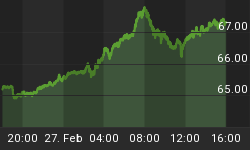Insanity is often defined as repeating the same action while expecting a different result. Recent Congressional activity to push through this year's second economic "stimulus" package certainly indicates that many of our political leaders may have special needs.
Responding to the $150 billion stimulus that was passed at the beginning of the year, I made the following observation in my February 15th commentary Upping the Inflation Dosage: "The failure of the stimulus plan to cure the economy will cause the Government, and the Wall Street brain trust, to conclude that it was simply too small. Their next solution will be to administer an even stronger dose."
It's interesting to recall that at the time, just 9 months ago, the $150 billion package caused much hand wringing, especially from Republicans still clinging to notions of Federal restraint. This was before an avalanche of more than $2 trillion in new spending initiatives -- before Bear Stearns, wide open discount windows, AIG, Fannie/Freddie, Federal Mortgage Auctions, Detroit loan guarantees, and preferred shares in the banks. In retrospect, the $150 billion stimulus seems quaint. It is not surprising that the latest package is expected to be twice as large. When this one fizzles, look for "Stimulus III" to be even larger.
The problem with our Government's version of economic stimuli is that it encourages the very activity that brought our economy to the brink of financial ruin in the first place. Quite plainly, the goal of all these plans is to give consumers more money to spend. However, excess consumer spending is part of the problem, not part of the solution. After a decade long spending orgy, market forces are finally trying to restrict consumer spending and dampen credit. But the stimulus looks to provide a new source of funds after savings, income, and credit have been exhausted. Our imbalanced economy is in desperate need of retrenchment, but stimulus plans will effectively hold the firemen at bay while throwing gasoline on the flames.
Politicians may say that the plan is not all about consumer spending, but is designed to fund investment. But investments conceived and executed by governments, and guided by political considerations rather than profit, often yield poor returns. The clumsy hand of the state is no substitute for the invisible hand of the free market. In addition, public sector "investment" often soaks up much of the capital which otherwise would have been available for more efficient private sector uses.
If the government were sitting on a pile of foreign reserves, then at least a stimulus plan could make some economic sense. But of course, that's not where the money comes from. To finance their largesse, the government either borrows more money from abroad, or gets it from the Fed, which simply creates it out of thin air. Either way, we undermine our economy with additional debt or inflation.
Unfortunately, the one stimulus we do need will not be supplied. To fix our current economic mess we need to diminish the activity that undermined our economy and encourage the behavior that will restore balance. Instead of encouraging Americans to go deeper into debt to buy more foreign products that we cannot afford, Americans should be encouraged to save their money, and produce more goods for export.
Fortunately, no government policy is needed to achieve this. Market forces would produce such incentives on their own. Higher interest rates and tighter credit world force people to borrow less, while simultaneously rewarding those who saved. A falling dollar that would eventually result from a recession would diminish our capacity to import while helping to restore our global competitiveness (provided it was accompanied by lower regulations and taxes) in manufacturing. Of course a lower dollar is not a good thing, but unfortunately it is the necessary consequence of our past profligacy.
Market based solutions would not be painless, which is precisely why our leaders resist them. However, as the saying goes, "no pain no gain". If we ever expect to make any legitimate progress, a higher pain threshold must be accepted.
If our elected officials really were concerned about easing the burden on consumers, they would be looking for way to reduce government spending. If government was less expensive, taxes could be lowered across the board. The only way for American citizens to spend more is for their government to spend less. Unfortunately, our government and the leading private economists believe that everyone can spend more without any serious consequences on the downside. It's a comforting idea, but it's a lie. The truth may not be pretty, but it's the only path towards a sustainable recovery.
For a more in depth analysis of our financial problems and the inherent dangers they pose for the U.S. economy and U.S. dollar denominated investments, read my just released book "The Little Book of Bull Moves in Bear Markets." Click here to order your copy now.
For an updated look at my investment strategy order a copy of my new book "Crash Proof: How to Profit from the Coming Economic Collapse." Click here to order a copy today.
More importantly, don't wait for reality to set in. Protect your wealth and preserve your purchasing power before it's too late. Discover the best way to buy gold at www.goldyoucanfold.com. Download my free Special Report, "The Powerful Case for Investing in Foreign Securities" at www.researchreportone.com. Subscribe to my free, on-line investment newsletter, "The Global Investor" at http://www.europac.net/newsletter/newsletter.asp.















